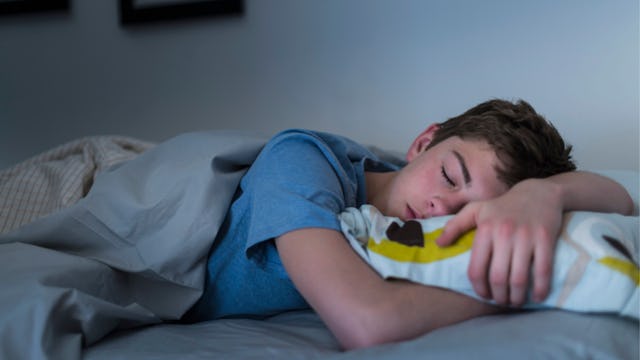Melatonin Has Drastically Improved My Child's Sleep Problems

A few months ago, I was chatting with some fellow tween/teen moms on Facebook about insomnia. My 12-year-old son, who has always had trouble falling asleep, was having a particularly hard time of it as of late. I explained that we’d tried just about everything: deep breathing, meditation, a weighted blanket, limiting screen time before bed. Nothing was working.
One by one, the moms told me what their answer was when their kids couldn’t sleep: melatonin.
RELATED: Can You Overdose On Melatonin? What To Know About This Sleep Aid’s Safety
I’d heard of melatonin, of course. I’d seen a lot of moms joking about “medicating” their kids to sleep with it, and the whole thing kind of rubbed me the wrong way. I’m not averse to medication or anything, but I’m stubborn, too, and I thought it would be more helpful for my son to learn how to relax his body, silence his thoughts, and practice good “sleep hygiene” than get knocked out with a pill.
Also, I knew that melatonin wasn’t FDA approved, and I couldn’t find that many studies about its use in kids. However, I did run across an article from the Academy of American Pediatrics (AAP) that was interesting and reassuring. The AAP echoes that melatonin is not FDA approved and that more research is needed on its use. But they also suggest that it can be helpful for kids in certain situations.
The AAP notes that melatonin is a natural “hormone-like substance” produced by the brain in response to nighttime darkness, and that taking melatonin is not the same as taking a sleeping pill. They suggest you discuss its use with your pediatrician and that short-term use – or using to “reset” your kids’ sleep rhythms – may be appropriate at times.
In fact, the AAP mentions that tweens and teens in particular sometimes need that reset, because their schedules don’t always match the rhythms of their bodies – i.e., tweens and teens are natural night owls who sleep in, but school schedules don’t exactly accommodate that.
“[Melatonin] may also help some older children and teens reset sleep schedules―such as after vacations, summer breaks, or other interruptions,” writes the AAP. “Most teens, after all, require more sleep―not less. Getting enough sleep each night can be hard for teens whose natural sleep cycles make it difficult for them to fall asleep before 11 p.m.―and who face a first-period class at 7:30 a.m. or earlier the next day; this is where melatonin may help.”
BOOM.
I suspected that this was part of what was happening with my son. He had been wanting to stay up later and later, and thus was having trouble falling asleep. And the later he stayed up stressing about not being able to fall asleep, the more “wired” he became. We were stuck in an endless cycle which resulted in a chronic lack of sleep.
So, after discussing it with a close friend of mine (who also happens to be a medical doctor), we decided to give it a go. We bought some melatonin gummies from the drug store, and – as per my friend’s suggestion – gave him a half dose of it (1mg).
Let me tell you, it was totally amazing. We gave it to my son about 30 minutes before bedtime, and for the first time in weeks, he fell asleep happily and easily. “My eyelids feel so heavy,” he said as he lay in bed. It didn’t make him groggy, just sleepy – and there were zero ill-effects by morning.
We gave it to him several days that first week to let his body “reset.” It went smoothly, except for one time when he took it too early and the effects were out of his system before he was ready to fall asleep (which goes to show that it doesn’t stay in your body for that long!). Within a week, though, he was generally sleeping more and was overall better rested.
Since then, we still use it regularly, though sparingly. We generally use it once a week, on Sundays after he’s slept in over the weekend, as a kind of reset for the week. Sometimes we skip it. Other times he asks for it if he knows a stressful day is coming up and his anxiety might make it hard to fall asleep. I was kind of worried about him relying on it for that, and was afraid it might become habit forming, but it hasn’t (and as far as I know isn’t a chemically habit forming substance).
My son has always had stress and anxiety around sleep. Somehow having the option of melatonin has given him some peace of mind, and I would say that overall, he seems more chill about falling asleep, even on the nights he doesn’t take melatonin. Just knowing there is an option for him if he needs it is a huge comfort.
Most nights, we do his meditation and breathing exercises to fall asleep, and I’m glad he’s developing those tools. But I also think it’s great he knows melatonin is there should he need a little extra help.
Obviously melatonin doesn’t work for everyone, and you should consult a doctor before using it. I am still personally a little uncomfortable with the fact that we don’t know much about the effects of long-term use. But I’m cool with using it a few times a month to help my kid get to sleep more easily. It’s truly been a game-changer for him.
This article was originally published on